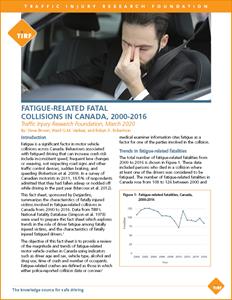Concern raised over fatally injured fatigued drivers who also tested positive for drugs
OTTAWA, March 09, 2020 (GLOBE NEWSWIRE) -- The Traffic Injury Research Foundation (TIRF) announces the release of a new fact sheet, Fatigue-Related Fatal Collisions in Canada, 2000-2016. The fact sheet, sponsored by Desjardins, summarizes the characteristics of fatally injured victims involved in fatigue-related collisions in Canada from 2000 to 2016. Data from TIRF’s National Fatality Database are included to describe trends in driver fatigue among fatally injured victims, and the characteristics of fatigued drivers dying in road crashes. Of concern, 40.8% of fatally injured fatigued drivers tested positive for drugs, and 22.2% of these drivers tested positive for alcohol.
Since 2000, the percentage of fatalities involving alcohol has declined whereas the percentage of distraction-related fatalities has increased. In contrast, the percentage of fatigue-related fatalities, while lower in number, has remained relatively stable during this period.
“While we have seen an overall reduction in fatigue-related fatalities since 2000, it has not matched the decline we’ve seen in other non-fatigue-related fatalities,” says Ward Vanlaar, Chief Operating Officer of TIRF. “In addition, results showing more than 40% of fatally injured fatigued drivers also tested positive for marijuana, CNS depressants, CNS stimulants and narcotic analgesics are concerning.”
The number of fatigue-related fatalities declined to 86 in 2016 which is the most recent year for which data are available. This decline is encouraging following the sharp rise to 119 in 2011 from 72 in 2010 and a previous increase from 108 to 126 between 2000 and 2002. However, for non-fatigue-related fatalities, the rate has decreased more consistently between 2000 and 2016. In other words, fatigue-related fatalities are not decreasing at the same rate as fatalities involving other factors.
“Police can face challenges in determining the role of fatigue in fatal crashes. For example, without eyewitnesses to confirm fatigue played a role, other contributing factors such as alcohol, drugs, distraction, or inexperience may take precedence in police reports,” explains Steve Brown, TIRF Research Associate. “Additionally, the data suggest four out of ten fatally injured drivers who were fatigued also tested positive for drugs demonstrating a crucial need for further monitoring of this issue.”
Download fact sheet in English and French:
Fatigue-Related Fatal Collisions in Canada, 2000-2016
Collisions mortelles liées à la fatigue au Canada, 2000-2016
About the Traffic Injury Research Foundation:
The mission of the Traffic Injury Research Foundation (TIRF) is to reduce traffic-related deaths and injuries. TIRF is an independent, charitable road safety research institute. Since its inception in 1964, TIRF has become internationally recognized for its accomplishments in identifying the causes of road crashes and developing programs and policies to address them effectively.
For more information, please contact:
Karen Bowman
Director, Marketing and Communications
Traffic Injury Research Foundation
250-797-0833 (cell)
613-238-5235 (office)
1-877-238-5235 (toll-free)
613-238-5292 (fax)
tirf@tirf.ca / karenb@tirf.ca
A photo accompanying this announcement is available at https://www.globenewswire.com/NewsRoom/AttachmentNg/40b26ce4-35dc-408a-be62-dc6ca3dacbda



